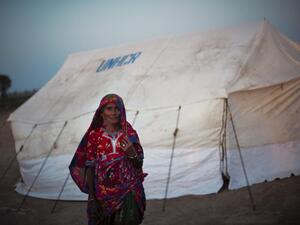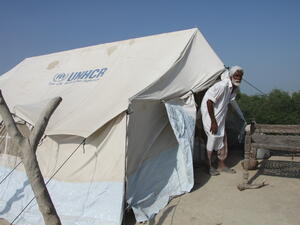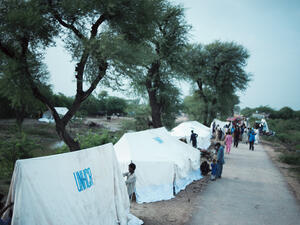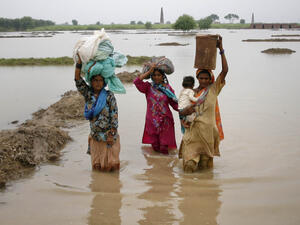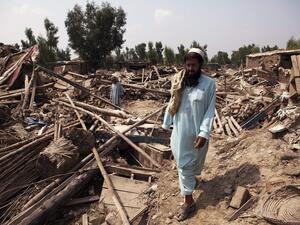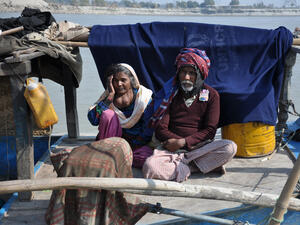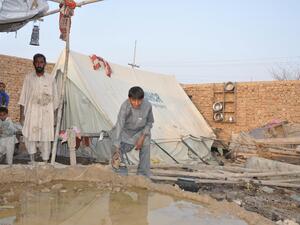Pakistan crisis likely to continue even after flood waters recede
Pakistan crisis likely to continue even after flood waters recede
In Pakistan, UNHCR is working to address protection and shelter needs among Afghan refugees, conflict-related displaced persons, and Pakistani communities ravaged by the on-going flooding crisis.
UNHCR staff took part yesterday in a government-organized helicopter assessment, flying over Mianwali in Punjab Province which has hosted more than 18,000 Afghan refugees for three decades, and also to Dera Ismail Khan in Khyber Pakhtunkhwa which hosts some 300,000 displaced people from the conflict last year, as well as local Pakistanis. Vast areas are still under water, and the helicopter was unable to land in Multan due to continued flooding in the Punjab.
UNHCR is concerned with the protection needs of everyone in Pakistan who has been displaced from their homes and without sufficient community support structures. We are working with the authorities, UN and NGO partners to ensure that basic needs are addressed. The provincial authorities in Khyber Pakhtunkhwa Province report that 653 schools are currently occupied by people affected by the floods. Some schools have as many as 10 families per room. The protection concerns for women and children in these crowded locations, including health and potential sexual violence or other abuse is a serious concern.
We have established protection teams in northwestern Khyber Pakhtunkhwa province focusing on the three hardest-hit districts, Nowshera, Charsadda and Peshawar. Similar efforts are underway in Balochistan province, which was first hit by the bloated rivers and where the vast distances between affected communities and our main logistics hub at Quetta hampers relief efforts - five of nine trucks that were dispatched from Peshawar a week ago are still trapped by landslides and flooding. Due to the lack of aid stockpiles in Balochistan, we are looking into airlifting supplies into the region.
In Khyber Pakhtunkhwa Province, refugee camps in 17 districts in the province have been overwhelmed by the flooding, erasing more than 12,600 homes and leaving 85,800 refugees homeless. Thousands of homes have been seriously damaged among both refugees and Pakistanis. These vulnerable, homeless refugees, many women, children and older persons, will be given priority to safe shelter and emergency food and medical help in coordination with our partners.
Illustrating the severity of the flooding is the Azakhel refugee camp, which was entirely destroyed and is now buried under at least a metre of mud, leaving more than 23,000 Afghan refugees homeless. UNHCR has distributed 1,100 tents and non food items (quilts and blankets, mosquito nets, kitchen sets, sleeping mats, etc.) to the refugees who have set them up in any dry area, even alongside highways. Some received aid this morning at Pirpai, where we have a distribution point set up near a hospital. We are also sending a further 1,000 tents to Swat, where our field team has been assessing needs among both internally displaced Pakistanis due to the conflict there and their host communities. We are working to fill gaps throughout the shelter cluster network of agencies and are also rushing aid to other areas of the country. 1,000 UNHCR all-weather family tents have already been airlifted by authorities to Sukkar and Shikarpur in Sindh Province.
So far UNHCR has distributed shelter materials to help more than 300,000 people, including more than 17,000 tents and 43,700 sheets of plastic tarpaulin, 103,000 blankets and quilts, 59,000 sleeping mats, 60,000 jerry cans and buckets, 18,500 kitchen sets, 18 metric tons of soap and 25,000 mosquito nets.
We want to warn everyone that the crisis facing Pakistan is enormous and still unfolding. There continues to be massive destruction as bloated rivers flow southwards across the plains. And this crisis will not be over when the flood waters recede - due to homelessness, hunger, and illness.
We have contracted with suppliers to deliver 69,000 all-weather family tents, as those we still hold in stock are being depleted rapidly. We are receiving 8,000 of these newly purchased tents a week and these are being distributed rapidly to affected areas. Plastic sheeting is also in very short supply.
We are still very much in the emergency phase of this crisis, but over the weeks and months to come, UNHCR will be helping refugee families and affected Pakistani communities to return to their homes in a dignified manner in coordination with their community leaders, responsible authorities and our partner agencies.

